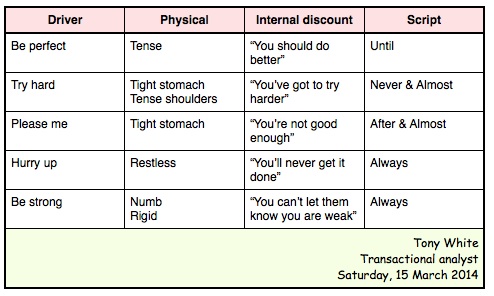Drivers are what we display to the world. They are easily observable to others. They form part of our persona and how our parents told us “Good people are.”
In this sense they are superficial psychological phenomena. However they have strong connections to deeper aspects of our psyche. Some of these are presented in the two charts below.
The final script payoff is of particular note. As people move into their 40s, 50s and 60s the final script payoff becomes much more obvious. We all have a life script and are all heading down that path through life to its inevitable conclusion. Slowly and surely we are making a whole series of decisions about our life over a long period of time to end up in a particular psychological frame of mind. Ironically, we always unconsciously knew we were heading there but don’t consciously realize it until we actually get there.
As we know the life script is an awesome psychological force. On the one hand our final script payoff is determined by the big decisions we make in life. What relationships we establish and end, the big financial decisions, work and career decisions, how we treat ourselves physically with diet, drug use, where and how we choose to live and so forth.
But much more powerful are the small decisions or conclusions we come to, about ourselves, others and life. These happen relentlessly day after day. After virtually every set of transactions with another, we walk away with our basic script decisions reconfirmed yet again, without us even being aware of it. Feeling and thinking good or bad about ourselves and/or the other.
Maybe it is this relentless day after day reconfirmation of the life script we are following that makes change off the life script path so difficult. This is why some claim there is probably only 10% to 20% of people who do significantly alter their life script course, such that it heads in a significant alternate direction. Most others do not do this but can still achieve two goals:
1: reduce the severity of the final script outcome to make it less hamartic
2: working with the script to increase the positives in it and reduce the negatives.



How can work with the script to increase the positives in it? [I have some knowledge of TA, as I have done some amount of basic TA training.]
Heartiest Thanks to Tony White for sharing his wonderful idea with friends.
Hello Susan, One could look for the positives that come from certain drivers and work on highlighting those. In some situations a Be perfect is very useful as is the Be strong. Tony
You are welcome Farzana, I hope the ideas are useful. Tony